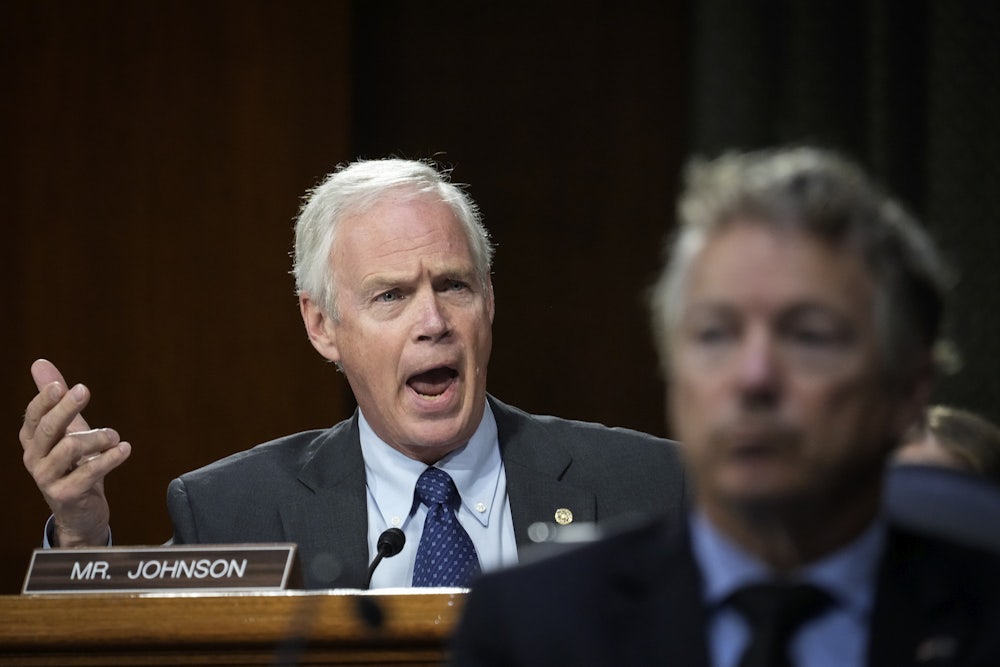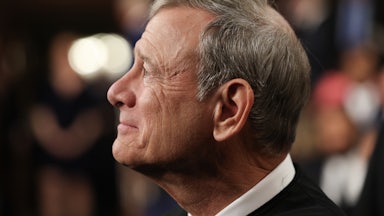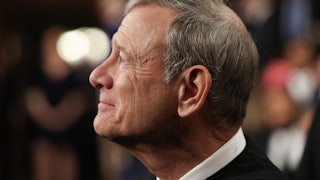There is fierce competition for the title of America’s worst senator. Ted Cruz, the perennial front-runner, is smug and oleaginous—hated equally by his colleagues and the public. Josh Hawley, who did more than perhaps any other person in the U.S. Senate to aid Donald Trump’s efforts to overturn a lawful election, is another leading contender. Lindsey Graham, the Senate’s remora, has become considerably craven now that he’s suckered himself onto Donald Trump’s body. Joe Manchin and Kyrsten Sinema have done no small amount of damage to their party’s own prospects. And Mitch McConnell has arguably played a larger role in creating our current very bad historical moment than any other figure in American politics.
And yet, even with these worthy contenders, Wisconsin’s Ron Johnson may very well be the worst of the lot. At the very least, he is the Senate’s most underrated—or perhaps overlooked—wreck. No one exemplifies the Senate’s post–Tea Party transformation better than Johnson, who was swept into office as part of the 2010 wave election. Over the ensuing decade, he has managed to consistently embody the worst of the GOP, transitioning seamlessly from the tricorn hats of the Tea Party to the red caps of MAGA: nativism, xenophobia, conspiratorial thinking, and an insistence that the government be utilized to reward certain groups and punish others.
Democrats have an opportunity to oust Johnson in November, pushing him out of office after two disastrous terms; his approval rating has fallen amid a cascade of scandals involving, among other things, the Covid-19 pandemic and January 6, 2021. Polls over the summer showed his challenger, the state’s Lieutenant Governor Mandela Barnes, leading by as many as seven points—though subsequent polls have shown a narrower race. Barnes, however, is polling well with independents, even as Johnson has tried to portray him as a radical future Squad member. Barnes, in case you haven’t guessed, is Black.
Barnes is also a rising star in the Democratic Party—a charismatic 35-year-old progressive who had spent two terms in the State Assembly before becoming lieutenant governor in 2019. But as a candidate in the 2022 midterms, he’s suffering somewhat from being overshadowed. Democrats have candidates who have become firmer fixtures in the news cycle running in a number of high-profile races: The races in Pennsylvania, Georgia, Arizona, and Ohio—and candidates like John Fetterman and Raphael Warnock—have pushed Wisconsin, and the tilt between Johnson and Barnes, to the second tier.
But while the race may be out of sight and out of mind, the GOP is doing what it can to keep Johnson from running out of money. On Wednesday, HuffPost’s Kevin Robillard reported that Republicans have drastically outspent Democrats in Wisconsin in September, spending more than $1 million more on advertisements in the lead-up to early voting. Much of the money being spent in the state has come from the free-flowing coffers of Mitch McConnell’s Senate Leadership Fund. Democrats, by comparison, are feeling a little bereft: “We can’t take Wisconsin for granted the way Wisconsin was taken for granted in 2016 when Hillary Clinton lost the state,” Joe Zepecki, a Democratic strategist, told HuffPost. “Where is the [cavalry]? The path to victory in Wisconsin is there.”
As Robillard notes in his piece, Barnes is struggling to keep up with other Democratic candidates in the big spotlight races. “A major issue: Barnes’ small-dollar fundraising dramatically trails other Democrats, in part because he did not officially become the party’s nominee until Aug. 2 and had relatively little national profile,” wrote Robillard. “As of his latest Federal Election Commission report, he’s raised just over $3 million in contributions of less than $200.” Val Demings, who is running against Marco Rubio in Florida and who will almost certainly lose, has raised more money than Barnes—an obvious problem.
Johnson is vulnerable for a range of reasons. He was intimately involved in Donald Trump’s attempt to overturn the 2020 election: His chief of staff tried to pass along a slate of fake elector certificates to Vice President Mike Pence, in an effort to overturn the election. Johnson has struggled to explain his role in this fake elector plot, excusing his involvement as only lasting a “couple of seconds.” Johnson has also admitted that he had tried to connect his chief of staff with a Trump lawyer in Wisconsin who was working on the fake elector scheme. He has, moreover, vacillated between insisting that the rioters on January 6 “didn’t seem like an armed insurrection” (not really true) and intimating that they were left-wingers posing as Trump supporters (really, really not true). He has continued to demand investigations into voter fraud in the 2020 election—despite the fact that there is no evidence such fraud exists.
Johnson strongly opposed mask mandates during the height of the Covid-19 pandemic and has been a proponent of vaccine skepticism, going as far as to host a panel of people who claimed to have serious adverse reactions to the vaccine. “First of all, the mounting data shows that they’re not working or are as safe as we all hoped and prayed they would be,” Johnson said on Fox News in October of last year—just before the omicron wave. A fierce opponent of abortion, Johnson has been glib in the wake of the repeal of Roe v. Wade, essentially telling residents of states that have banned abortion that they can simply go somewhere else if they want one. “It might be a little messy for some people, but abortion is not going away,” Johnson told The Wall Street Journal earlier this year.
That, of course, may not be the case: Lindsey Graham has already proposed a bill that would ban abortion nationally; it’s highly likely that Republicans will seek such legislation should they retake both chambers of Congress and the presidency. More recently, Johnson blithely dismissed the idea that Donald Trump did anything wrong by hoarding extremely sensitive classified documents at his Mar-a-Lago country club. “First of all, I think Mar-a-Lago is a pretty safe place. It has Secret Service protection, sounds like these documents might have been in a safe,” Johnson told a Wisconsin TV station. “So no, I’m not overly concerned about some top-secret information getting leaked out.” Johnson went on to say that the Justice Department had gone too far by ordering a raid on a former president’s house.
Johnson, in other words, is ripe for the plucking. But we’ve seen this story before: In 2016, the man Johnson defeated to claim a seat in the Senate, Russ Feingold, fell short of his goal to take it back, fumbling his polling advantage away in the final weeks of the election. In Barnes, the Democrats have found a candidate who could yet pull off the feat, a fresh face who’s claimed some momentum they didn’t expect. But if they can’t elevate their man in the Badger State and make his candidacy a cause célèbre among party donors, Johnson could end up pipping them at the post yet again.










